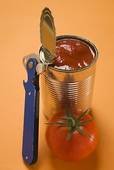
Today, I'd like to share some important information with you about one of the MOST problematic chemicals that you're being exposed to, specifically through canned foods and bottled drinks...
Bisphenol A is the chemical's name (BPA)
BPA can be found in some types of plastic bottles, as well as the lining inside canned foods.
Because BPA is a known "xenoestrogen," it's been linked in animal studies (at surprisingly low doses) to a wide range of health problems, including cancer, metabolic disorders, heart disease, diabetes, fertility issues, birth defects, and miscarriages... and, of course, any xenoestrogen in large enough amounts can cause your body to store abdominal fat (aka - stubborn belly fat ).
Polycarbonate bottles (some plastics with the #7 symbol on the bottom are polycarbonate, but not all) and canned foods are the main offenders to look for because the lining of most canned foods contains BPA, which can leach into food. The longer a can of food sits on a shelf and the higher the temperature, the more BPA leaches into the food. The same is true for polycarbonate bottles containing food or drinks.
According to the Environmental Working Group (EWG), in one CDC study, BPA was found in the bodies of 95 percent of Americans (this is a worldwide issue though, not just limited to the US). This is also not something to dismiss... take a look at this terrifying discovery...
The Environmental Working Group reports, "An analysis of our tests reveals that for one in five cans tested and for a third of all vegetables and pastas (ravioli and pasta with tomato sauce), a single serving would expose a woman pregnant to BPA at levels that fall within a factor of 5 of the doses linked to birth defects - permanent damage to the development of male reproductive organs."
If that didn't pique your interest, how about this...
The EWG also reports evidence of... "A study demonstrating that low doses of BPA stimulate both the formation and growth of fat cells, the two factors that drive human obesity (Masumo et al. 2002)."
This is not surprising given that, as I mentioned at the outset of this article, BPA is a known xenoestrogen, and any xenoestrogen can contribute to "stubborn abdominal fat," as well as cancer and other health issues.
It's also worth noting that canned tomato products (canned ravioli, pastas, canned tomato pastes, tomato sauces, and so on) are among the worst offenders, with the highest BPA concentrations, due to the acidic nature of tomatoes, which leaches more of the BPA.
So, what can you do to reduce your exposure to BPA and its negative effects on body fat and other health risks?
Try to avoid canned foods as much as possible and instead opt for frozen or fresh foods. Instead of using canned foods, buy the ingredients yourself and prepare the meal the old-fashioned way. Products in glass containers are also a better alternative to canned foods.
If you must use canned foods instead of fresh foods, look for labels that state that the cans are BPA-free.
If you need tomato products, avoid canned varieties and instead look for tomato sauces, pastes, and so on in glass bottles (unless they can specifically state that it is BPA-free). Alternatively, you can make your own tomato dishes from scratch using fresh tomatoes.
If you use plastic wrap, ziplock bags, or plastic containers for food storage, check the label to see if the product is BPA-free. Some brands' packaging will indicate whether or not their products are BPA-free.
If you must use a microwave with your food (which, by the way, is thought to have negative health effects), then do not microwave the food in plastic containers as this can increase the leaching of chemicals such as BPA.
If you drink bottled water or water from reusable plastic bottles, make sure the bottle is not made of polycarbonate or that the label says BPA-free. Plastic with the number 7 on the bottom may or may not contain BPA. If a bottle has the letters "PC" on the bottom, it is made of polycarbonate and thus contains BPA. Furthermore, aluminum bottles may contain a BPA-containing lining; avoid these.
Avoid soda cans, as an EWG study found that 42 percent of soda cans contained BPA. Of course, if you care about your health and body, I'm sure you never drink soda in the first place because it's pure evil for your body... and yes, that includes unhealthy diet soda with its dangerous artificial sweeteners.
Never use plastic cups for hot liquids like tea or coffee, as this can speed up the leaching of BPA and other chemicals, depending on the type of plastic.
Regardless of how hard you try to avoid BPA and other xenoestrogens, you will almost certainly be exposed to some levels of xenoestrogens from various chemicals in your foods (from pesticide/herbicide residues, packaging chemicals, and so on), chemicals in your water supply, chemicals from cosmetics, lotions, and so on.
However, certain powerful phytonutrients found in foods such as onions, garlic, chamomile and green teas, and cruciferous vegetables can help to protect you and counteract these harmful xenoestrogen chemicals in your body. In fact, read this article to learn how three specific vegetables can aid in the fight against abdominal fat by counteracting xenoestrogens.
If you follow the majority of these recommendations, you can help to protect yourself and your family from the health risks posed by bisphenol-A. (BPA). You can also help protect yourself from the problem of "stubborn abdominal fat" that can be caused by the xenoestrogen effect of BPA exposure... which I'm sure you'd prefer to avoid!
If you found this post interesting, please forward this article to your friends and family to help them protect their health from exposure to BPA.
If you are interested in topics related to health and wellness, read this article as well: (Beware of those "healthy" foods that CAUSE weight gain, diabetes and cancer )